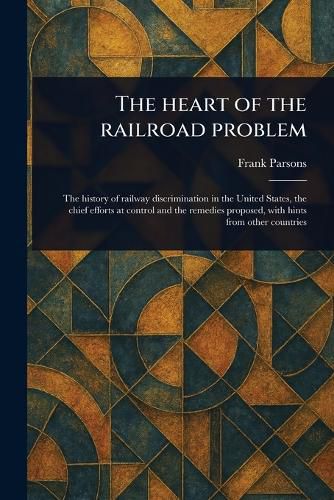Readings Newsletter
Become a Readings Member to make your shopping experience even easier.
Sign in or sign up for free!
You’re not far away from qualifying for FREE standard shipping within Australia
You’ve qualified for FREE standard shipping within Australia
The cart is loading…






This title is printed to order. This book may have been self-published. If so, we cannot guarantee the quality of the content. In the main most books will have gone through the editing process however some may not. We therefore suggest that you be aware of this before ordering this book. If in doubt check either the author or publisher’s details as we are unable to accept any returns unless they are faulty. Please contact us if you have any questions.
Delve into the complex history of American railroads with Frank Parsons' "The Heart of the Railroad Problem." This meticulously researched work explores the pervasive issue of railway discrimination in the United States, focusing on freight rates and their impact on interstate commerce.
Parsons meticulously details the historical context, examining the chief efforts at control and the various remedies proposed to address unfair practices. Drawing on examples from other countries, the book provides a comprehensive overview of the challenges and potential solutions surrounding railroad regulation.
A vital resource for those interested in economic history, transportation law, and the evolution of business practices in the United States, "The Heart of the Railroad Problem" offers invaluable insights into a pivotal period in American development. Discover the enduring relevance of this classic study on the intersection of railroads, law, and economic fairness.
This work has been selected by scholars as being culturally important, and is part of the knowledge base of civilization as we know it.
This work is in the public domain in the United States of America, and possibly other nations. Within the United States, you may freely copy and distribute this work, as no entity (individual or corporate) has a copyright on the body of the work.
Scholars believe, and we concur, that this work is important enough to be preserved, reproduced, and made generally available to the public. We appreciate your support of the preservation process, and thank you for being an important part of keeping this knowledge alive and relevant.
$9.00 standard shipping within Australia
FREE standard shipping within Australia for orders over $100.00
Express & International shipping calculated at checkout
This title is printed to order. This book may have been self-published. If so, we cannot guarantee the quality of the content. In the main most books will have gone through the editing process however some may not. We therefore suggest that you be aware of this before ordering this book. If in doubt check either the author or publisher’s details as we are unable to accept any returns unless they are faulty. Please contact us if you have any questions.
Delve into the complex history of American railroads with Frank Parsons' "The Heart of the Railroad Problem." This meticulously researched work explores the pervasive issue of railway discrimination in the United States, focusing on freight rates and their impact on interstate commerce.
Parsons meticulously details the historical context, examining the chief efforts at control and the various remedies proposed to address unfair practices. Drawing on examples from other countries, the book provides a comprehensive overview of the challenges and potential solutions surrounding railroad regulation.
A vital resource for those interested in economic history, transportation law, and the evolution of business practices in the United States, "The Heart of the Railroad Problem" offers invaluable insights into a pivotal period in American development. Discover the enduring relevance of this classic study on the intersection of railroads, law, and economic fairness.
This work has been selected by scholars as being culturally important, and is part of the knowledge base of civilization as we know it.
This work is in the public domain in the United States of America, and possibly other nations. Within the United States, you may freely copy and distribute this work, as no entity (individual or corporate) has a copyright on the body of the work.
Scholars believe, and we concur, that this work is important enough to be preserved, reproduced, and made generally available to the public. We appreciate your support of the preservation process, and thank you for being an important part of keeping this knowledge alive and relevant.